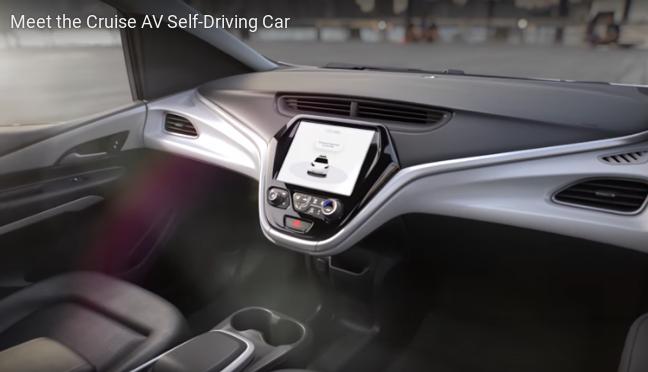Plans of the car industry, and my vision of driverless cars
Two recent articles from the top of the car industry confirm my assumptions and positions on driverless cars, and the right way to call and manage them.
General Motors wants to (totally) remove the manual controls from its test cars in 2019
The reason? “Regulations say you need a steering wheel airbag, but what if there is no wheel? A passenger side airbag even on that side is OK, right?”

The CEO of Ford, instead, just asked for a major overhaul of major cities to make them “cope with the rise of driverless cars, taxi apps and booming urban populations, warning that city centres will grind to a halt otherwise”, and that “cities filled with cars had become a threat to civic life”:
“Parking lots overtook community centres. Fast food centres crushed the family diners and restaurants. Technology has been at the expense of our shared sense of belonging”. Therefore, said the CEO, “the city’s transportation grid [must] mutate around what the cars need.”
Are you appreciating the real meanings of such statement, that is who is making them? This is not your usual hippy, Amish-like, hardcore green warrior. It’s the top brass of a major corporation whose reason to exist is to sell as many cars as possible. Why? And why do its GM competitors make cars impossible to drive personally, that is void of almost the glamour that justified their purchases for decades?
CEOs are not stupid
In my humble opinion, both Ford and GM, together with all major carmakers around, have already realized, much better than their customers, that we have reached “peak car”. They must keep showing profits every quarter, undefinitely, while pollution, urban congestion and inequality are increasing, and likely to continue to so for a few more decades. Even if the pollution from car engines disappeared, and the increasing world population could keep buying cars at the same pace it did in the 20th century, there would simply would not be no space to use those cars as in the past. Why buy them, then?
The car CEOs have realized this. For the same reasons, and considering Uber, they have also realized that there is a lot of value in selling “personal mobility services”. Point is, those services, in order to be profitable, demand a deeply different kind of cars.
What the executives of General Motors said is quite simple: if a completely, immutably driverless car costs much less to produce, service and operate, and if having only such cars on the road greatly increases safety, why should we keep wasting money doing cars the old way? Cars, that is, that humans may drive creating unnecessary dangers for themselves and others? Cars that we, the car companies, could control and run directly, instead of leaving all that power and money to any individual, or any company like Uber?
Cars are useless without roads and cities to drive in
The Ford CEO simply completed the list of requirements from car makers to govermment. Leaving competitors, er I mean human drivers, without a steering wheel to control is not feasible, unless you don’t remove those sources of trouble also from around the cars too. In other words, the car industry is confirming that driverless cars aren’t sustainable, economically and safety-wise, unless such cars are the only ones in the streets, and unless those streets are (re)made to separate cars from pedestrians and everything else. Which is the same point I made a while ago about the real name, and value, of driverless cars.
I agree with those executives, about the cost and safety issues: the more a car is really driverless, and operating in driverless cars environment, the better it is.
The only difference between the car industry positions and mine is about who should control the whole picture, and the starting point. The Ford CEO said that “The city’s transportation grid [must] mutate around what the cars need” he said." I say the opposite, that is: “cars must mutate around what cities need to become, or return, really livable. This means cars must become driverless and shared**. Again, see my post about on-demand micro trains for details.
Who writes this, why, and how to help
I am Marco Fioretti, tech writer and aspiring polymath doing human-digital research and popularization.
I do it because YOUR civil rights and the quality of YOUR life depend every year more on how software is used AROUND you.
To this end, I have already shared more than a million words on this blog, without any paywall or user tracking, and am sharing the next million through a newsletter, also without any paywall.
The more direct support I get, the more I can continue to inform for free parents, teachers, decision makers, and everybody else who should know more stuff like this. You can support me with paid subscriptions to my newsletter, donations via PayPal (mfioretti@nexaima.net) or LiberaPay, or in any of the other ways listed here.THANKS for your support!